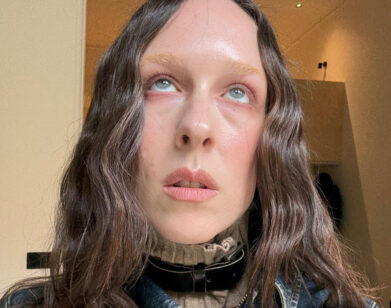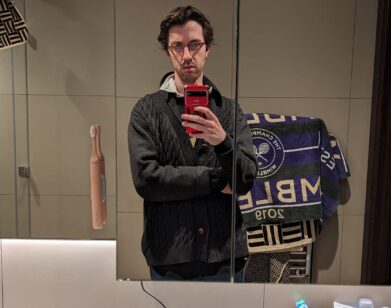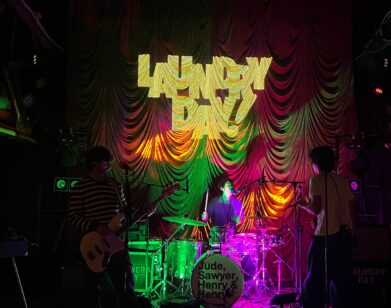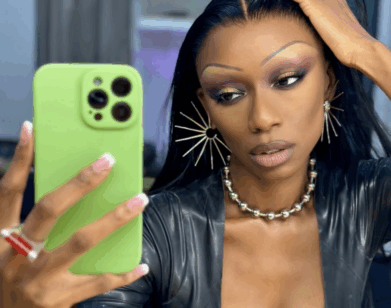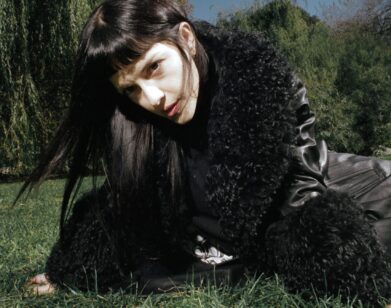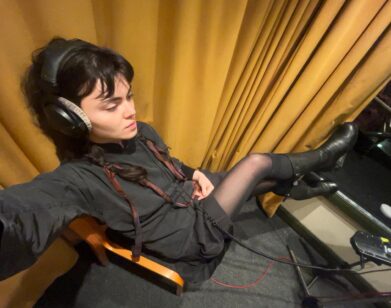Warpaint: LA is Existential
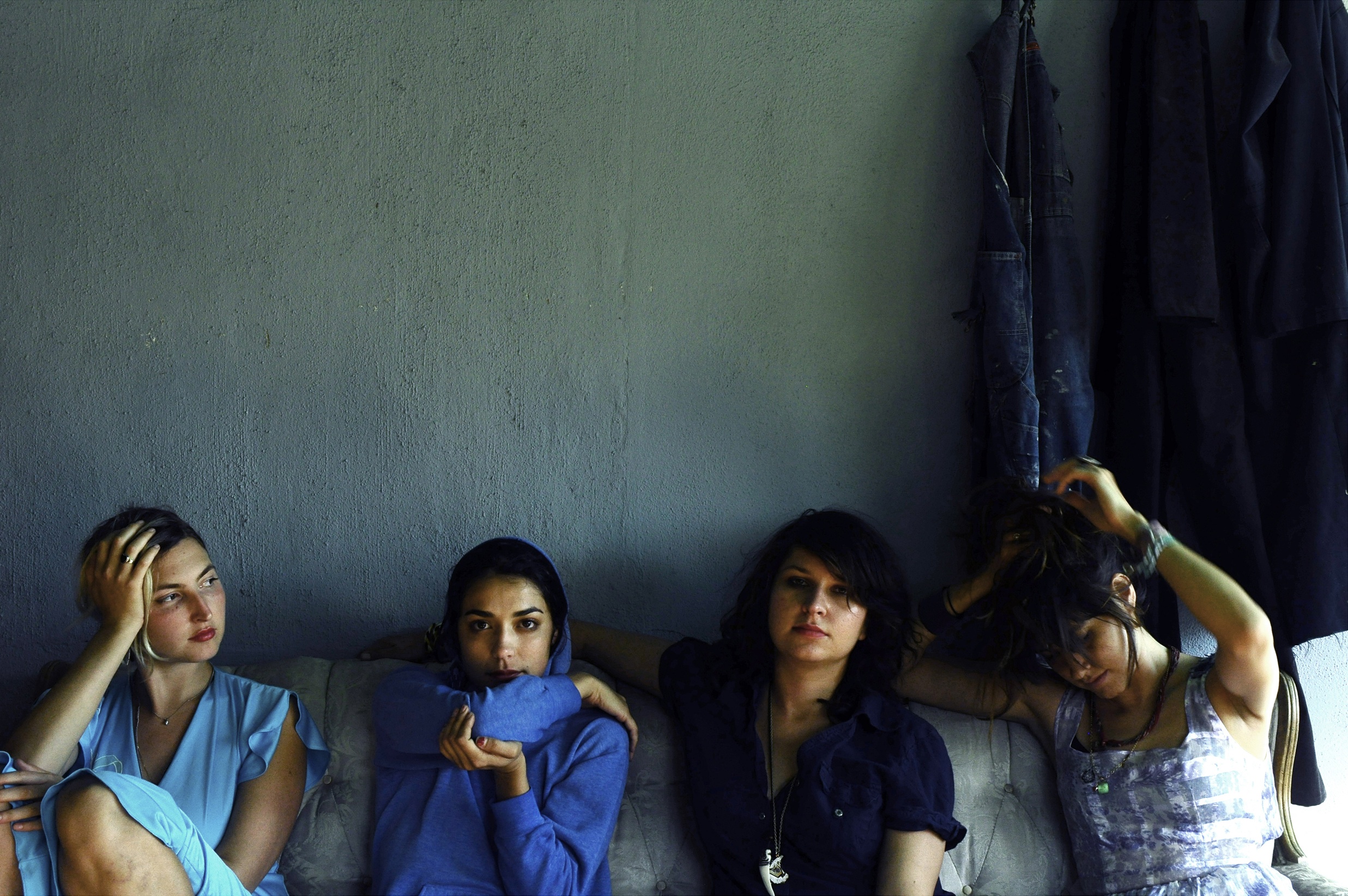
WARPAINT IS (L-R): EMILY KOKAL, JENNY LEE LINDBERG, STELLA MOZGAWA, AND THERESA WAYMAN. PHOTO COURTESY OF BEGGARS GROUP/MIA KIRBY.
When the cursor moves across the board of recent press for Warpaint, it spells out the following. The band members are female. The music made by these four L.A.-based females is indicative of a West Coast “vibe”—or, if you will, a California spirit animal that ingested a dream pill. The live performances by the group are consistently impressive. Earlier this month, when Warpaint opened for The xx at Washington Heights’ United Palace, an underused venue of dizzying gilded ceilings and eerie red church light, it proved the perfect setting to experience them in concert. A collision of intimacy and power, the renditions of cuts off their debut album swirled through the proverbial art-school rafters into the grip of a mature and entrancing artistry. The album, entitled The Fool, out October 25, is Warpaint’s first release since signing with Rough Trade last year. It builds on the promise of Exquisite Corpse, their acclaimed 2008 EP mastered by John Frusciante, but is separated by a thematic and sonic darkness, a spectrum of wild emotion traversed with the lights off. (Not to figure out, as the band suggests below, the light from a joint.)
On The Fool, the youthful vocals of Emily Kokal and Theresa Wayman occasionally blend while stirring up the eras of Stevie Nicks, Luscious Jackson, and Siouxie Sioux (credited as a guest mixer). But during the concert, when they performed the album’s highlight, “Composure,” in which the girls’ vocals are semi-shouted, a spectral tug-of-war of self-doubt bedded in shimmery guitar, the live version was beyond compare. Shortly before they took the stage that evening, I had a few minutes to speak with Kokal and drummer Stella Mozgawa. When we finished, bassist Jenny Lee Lindberg led them both single-file from the dressing room, singing Mariah Carey’s “Dream Lover” the entire way, until they were outside for a quick smoke.
HUNTER STEPHENSON: Where did you record the new album?
STELLA MOZGAWA: We did it with a producer fellow called Tom Biller (Liars, Beck). Originally, we recorded in his studio which was an old women’s fitness center called Coves, so he calls it Coves Studio. I guess even while we were recording there, it felt pretty novel. There was still a lot of gear from others’ bands, and an accumulation of these goods. The outdoor area in the back connected to a weird Mexican restaurant-slash-bar or something. And the recording area was just one long room, this long white passage, and we tracked most of the songs there.
EMILY KOKAL: We were really excited by how everything sounded there, Stella’s drums sounded amazing. But then when we went to South by Southwest, he lost his studio. So, Stella ended up recording some of our vocals at a friend’s house. [LAUGHS] Yeah. It ended up a pretty varied experience.
STEPHENSON: More so than on Exquisite Corpse, the vocals stood out as a major force on the new album. We’ve talked about recording, but how did you approach the lyrics, and Emily, what is your writing process like?
KOKAL: I’ve tended to write lyrics alone, but the way we write in this band, when we’re jamming with everyone in the room, a lot of times the melodies tend to almost create the lyrics, they create syllables. The emotion of the melody comes first. On the new record, the songs “Baby” and “Shadows” were written start to finish vocally before they were brought to the other members. But what stimulates us are usually these dreamy minor chords. We all feel we’re an emotional band as far as writing, but the specific emotions tend to be of a melancholic, or of an almost sinister-yet-beautiful nature. I never think of our songs as being about boy-girl relationships or ultra-female. The music comes from a universal place and to me, the new album doesn’t feel as emotionally heavy as it may to some. To me, it feels like life.
STEPHENSON: The press often focuses on the influence of L.A. on the band’s music. “Ethereal” and “Californian” are common adjectives…
MOZGAWA: Yeah. But, like, what does it even mean to be an L.A. band anymore? I always see that and think it’s so archaic. I don’t think there’s anything particularly L.A. about our sound, apart from the fact that we live in the same city.
KOKAL: If anything I think we connect to what our parents were listening to when they were our age. I’m listening to a lot of classical and electronic music right now, like Aphex Twin, non-vocal music. Being on tour with The xx probably has something to do with that too. But also I think my taste right now is related to listening to Enya as a kid. It’s the next step. And because Stella joined our band three weeks before we started recording, I feel as if I never had a chance to write with her before the tour. So to play with her on stage, we’ll jam together. I think maybe that confuses audiences, but we’ll keep doing it, we’ll jam forever [live].
MOZGAWA: Opposed to the “L.A.” thing, something I find really inspirational is a movie I watched recently off-tour called The Five Obstructions by Lars von Trier. I fucking loved it and I love him in general. I don’t think I’m being sycophantic when I say it’s von Trier’s greatest film. It’s really about the concepts [and struggles] of the creative process. It’s about what every band, artist, and filmmaker on the planet is doing this instant. I could go on. But it’s about enjoying and trusting whatever happened naturally, instead of lingering on “How could we have done things better?” Everyone is so interested these days in “what happened?” behind a film or an album, but the focus is too often on what went wrong instead of appreciating the work for what it is. [LAUGHS] With so many albums these days, they are [presented] like Lost in La Mancha or something. I really love The Residents for that reason. They have a sort of [spontaneous] creativity. They’ll make an entire album of jingles, just to see what results.
STEPHENSON: Is there a story behind the last song on the album, “Lissie’s Heart Murmur”?
KOKAL: Yes. “Lisse’s Heart Murmur” was one of the first songs we worked on as band, and “Set Your Arms Down” is a song we finished when we were a three-piece in 2006. “Lissie’s Heart Murmur” is actually about a girl who decides to become a mermaid because her love lives underwater. So, she has to decide to move there, she has to decide to let go of the world. It’s about how there’s no turning back when you decide to really bond with someone. But it’s a very happy love song. The album’s title, The Fool, is a reference to a state of innocence, to push yourself to see who you are, with the potential of falling on your face to reach liberation. The risk of laughing at the wrong moment or to choose not to act like you know everything. As a band, we’re all trying to be naked, if you will. As naked as we can be.
MOZGAWA: I only wear clothes because it’s illegal not to.
STEPHENSON: Sure. I noticed the tracks are bookended by two longer song titles.
MOZGAWA: Wait, what? I didn’t think about that…that’s pretty cool.
KOKAL: Yeah, it’s true. I don’t think that was intentional.
JENNY LEE LINDBERG: It’s stoner order. We made this album to listen to stoned. Originally, “Set Your Arms Down,” the first song, ended the album and “Lissie’s Heart Murmur” started it.
KOKAL: Yeah, we definitely recommend listening to the new album after smoking. It’s the best.
MOZGAWA: Okay, this is a good point for everyone to start drinking. [LAUGHS]
“UNDERTOW,” DIRECTED BY SHANNYN SOSSAMON.

